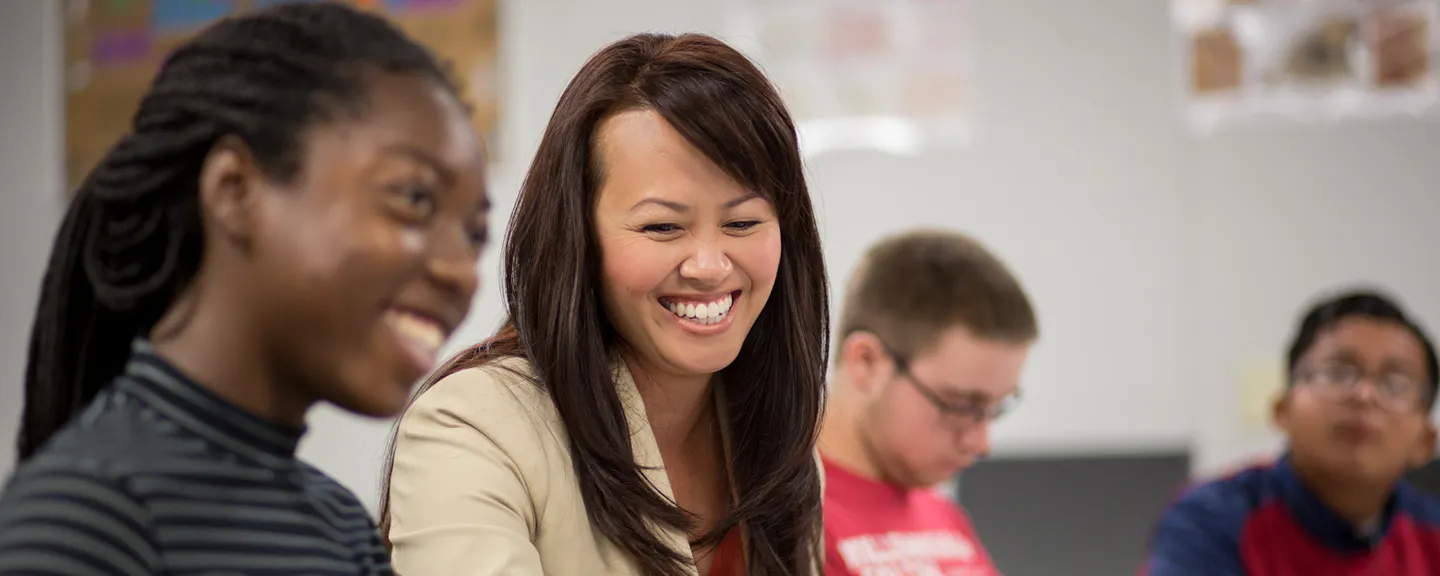- Home
- >
- APU Articles
- >
- News Article
Switching Careers: Why a Transition to Teaching Is Worth It
November 20, 2019 | Written By Stephanie Thurrott

That was the case for Ken Kienow, who is pursuing a Single Subject Teaching Credential in mathematics at California Polytechnic State University in San Luis Obispo. Kienow decided on switching careers after eleven years as a professional photographer. As his kids got older, he wanted a career that left more of his weekends open to be with his family.
Kim Lu Lawe, EdD ’16, also made the transition to a career in education. Lawe initially planned a career in the medical field, but realized that might not be the best fit for her—so she shifted her focus to biology research and landed a job with the Department of Fish and Game. “My boss advised me to go back to school to get a master’s degree in science so I would have the option of laboratory science research,” she said. “I was advised to consider a teaching job while I was earning my graduate degree. At the time, there was a shortage of math and science teachers in K-12 public education, so I was able to get a job with an emergency teaching credential.”
“Having had no teacher education training, I struggled as a first-year teacher and didn’t plan to stay in the role—until God helped me realize my calling,” Lawe said. Her career change became her life’s work, and she now leads the Eastvale STEM Academy at Eleanor Roosevelt High School in the Corona-Norco Unified School District.
Educating Others Is Rewarding
Lawe noted that she appreciates how educators can make a real difference in their students’ lives. “It’s a different journey that leans more toward servant leadership,” she said. “I think many who are switching careers into education are striving for significance; realizing you want to leave a legacy in life through impacting lives.”
In particular, Lawe emphasized a key difference between education and the private sector. Whereas many professionals in other fields strive to serve customers with the explicit goal of pulling in revenue for their company, educators’ primary customers are their students—and their goals are oriented around serving them and their communities.
Kienow sees the potential in working with junior-high students in particular. He noted that teachers have the opportunity to change the entire trajectory of a student’s learning, and he’s excited about having a positive influence on students of that age.
What Aspiring Teachers Should Know
Switching careers means your educational experience may differ from a traditional path. Here are a couple of things you should know if you’re charting your path toward a teaching degree.
You may be more focused. Kienow explained that when he started his undergraduate education, he still didn’t really know what he wanted to do, and he ended up changing his major a few times before finally settling on math. But during his graduate school experience, he said he had a clear idea of the kind of career he wanted to pursue. Working toward a specific purpose can make the curriculum feel more rewarding.
You’ll likely enjoy returning to the classroom. Kienow said that many of his classmates in graduate school are coming straight from undergraduate programs, but a few are transitioning professionals like him. The conversations shared between the diverse set of students often make class time even more enjoyable and effective. Kienow also noted that he enjoys doing his homework at the dinner table while his kids work on theirs.
Opportunities for Teachers in California
Lawe pointed out that there will always be a need for talented educators and that California needs more qualified STEM teachers. “Those who major in STEM fields often go right into the private sector because they earn more money,” she said. “Very few decide to initially go into education with STEM degrees,” she said.
And yet, it’s an incredibly rewarding profession. Lawe explained the pivotal role STEM educators play in helping students use their creativity to explore new topics. Those students, she said, will go on to discover answers to important questions that don’t even exist yet.
Azusa Pacific University offers a number of pathways for becoming a teacher, providing both undergraduate and graduate students with opportunities to earn a teaching credential. Whether you’re interested in becoming an elementary, middle, high school, or special education teacher, there is a degree program for you.
Are you looking to switch careers and work toward an education degree at APU? Visit the school’s website to learn more about its different pathways for teachers.